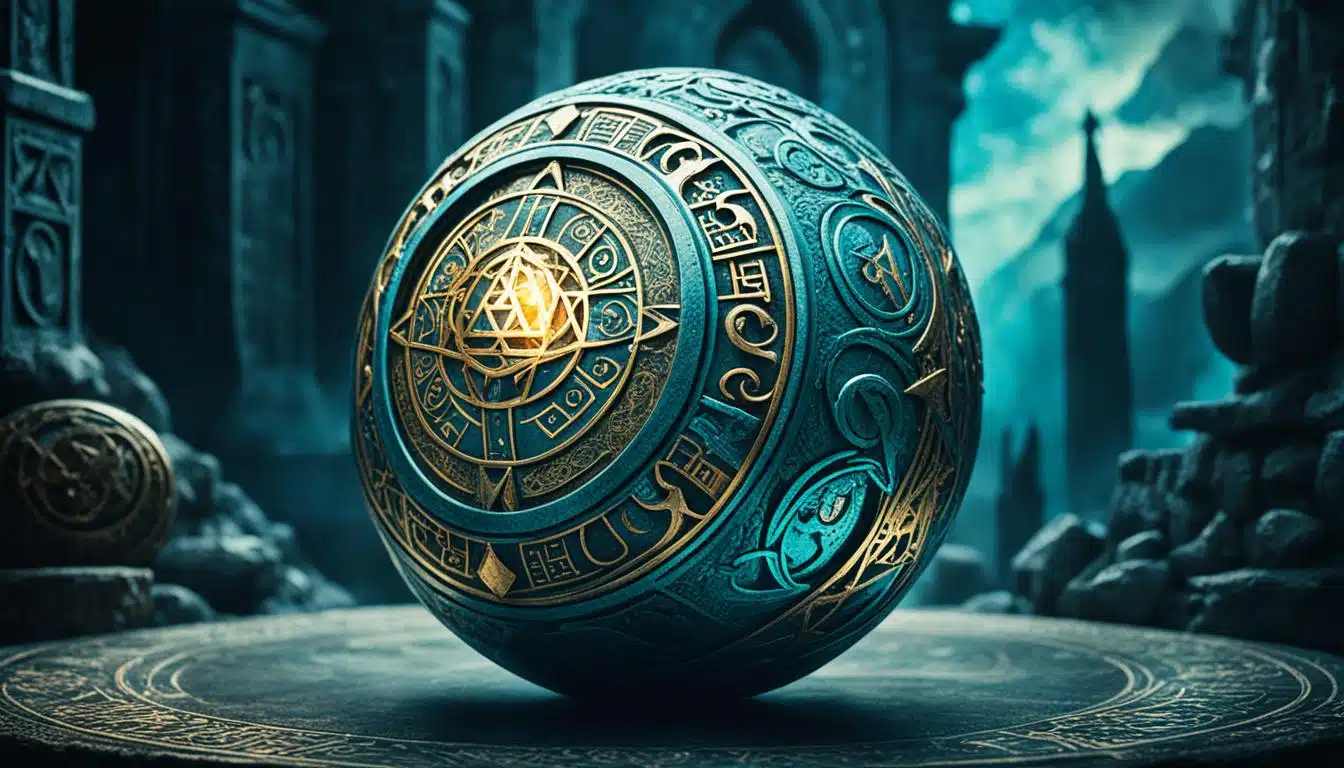Prophecies have fascinated people for ages, offering a peek into the future and divine wisdom. The art of foretelling future events, prophecy, is deeply rooted in various religious and cultural traditions. This includes the revelations in the Bible and foretold events in modern times. These prophecies have significantly influenced the course of history.
Prophets, seen as people who could understand divine messages, have always intrigued us. They predicted future events, whether in the Bible, the Oracle of Delphi’s cryptic words, or Nostradamus’s foretellings. These prophecies have captured the imagination of both believers and skeptics over the years.
This piece will explore prophecies’ world, looking into their historic importance, cultural impacts, and lasting legacies. We’ll cover everything from biblical stories to the Mayan calendar’s predictions. These discussions aim to show their relevance and our shared human interest in knowing what the future holds.
Key Takeaways
- Prophecies have captivated the human imagination for centuries, offering insights into the divine and glimpses of the future.
- Prophets, individuals believed to have the ability to receive and interpret divine messages, have played a significant role in shaping the course of history.
- Prophecies can be found in various religious and cultural traditions, from biblical narratives to ancient Greek and Roman prophecies.
- The interpretation and significance of prophecies have been the subject of ongoing debate and controversy, with some prophecies being debunked as hoaxes or misinterpretations.
- The enduring fascination with prophecy reflects the universal human desire to understand and anticipate the future, and the belief that the divine can offer glimpses of what is to come.
Introduction to Prophecie
Definition of Prophecy
A prophecy is a prediction of the future, often seen as coming from a god or a supernatural source. These predictions might come in dreams or visions. They could also be direct messages from a higher power. Those who can understand and tell these messages are called prophets.
Historical Significance of Prophecies
Prophecies have shaped our history in big ways. They have guided actions from ancient times to the present. These predictions have influenced how people think and act, often driving major changes in society. The impact of prophecy spans across many cultures and ages.
Famous Prophets and Seers
Many throughout history have been called prophets or seers. They were known for understanding and sharing messages from above. Biblical figures like Moses and Isaiah are often thought of as prophets. Mystics such as Nostradamus and seers from various tribes have also left their mark.
Nostradamus and His Prophecies
Life and Background of Nostradamus
Michel de Nostredame, known as Nostradamus, was a famous French seer and doctor in the 16th century. He was born in 1503 in France. Nostradamus’ family was Jewish but became Catholic. This was because of the environment they lived in.
He learned Latin, Greek, Hebrew, and math, and was very interested in astrology and things like magic.
The Lost Book of Nostradamus
Nostradamus is famous for his prophecies, but there’s more to his story. A ‘Lost Book of Nostradamus’ is rumored to exist. It’s supposed to have more of his prophecies that were never shared.
The book’s realness is argued over a lot. Some say it’s a fake. But the idea of this book has led to many stories and conspiracy theories.
Nostradamus’ Quatrains and Predictions
Nostradamus wrote many quatrains, which are poems with four lines. He put them in a series of books called “Les Propheties.” These poems are hard to understand and talk about different future events. People have tried for years to figure out what they mean.
Some folks believe Nostradamus really could predict the future. They think he was talking about things like wars, big political changes, and the world’s end. His poems have made a big impact on how we think about the future.
Biblical Prophecies
The Bible is seen as sacred by many, and it’s full of prophecies that intrigue believers and experts. These prophecies are found in both the Old and New Testaments. They give us a glimpse into past, present, and future events.
Old Testament Prophecies
The Old Testament is a treasure trove of prophecies. Many figures were said to have been inspired by the divine to predict the future. Moses, Isaiah, Jeremiah, Ezekiel, and Daniel are some of the key prophets. They’ve given us prophecies that we’ve been studying for centuries. These prophecies touch on the coming of a Savior, the future of nations, and the end of the world.
New Testament Prophecies
Prophecies also fill the New Testament, with Jesus making many predictions. For example, he talked about the fall of the Temple in Jerusalem, the growth of Christianity, and the apocalypse. The Book of Revelation, penned by the apostle John, stands out. It’s a complex look at the end of days and the victory of good over evil spirit of prophecy.
Prophetic Figures in the Bible
Beyond the well-known Old Testament prophets, the Bible features others with foresight. John the Baptist, for instance, predicted the arrival of the Messiah. The apostle Paul also had his share of vision and prophecy. The Bible’s prophetic tradition is still a major area of religious study. Believers and scholars alike often discuss the meaning of these ancient prophecies.
Prophecy
Prophecy is when someone predicts what will happen in the future. This could be based on a vision, a dream, or a message from a god. People who can understand these messages and share them are called prophets.
These predictions have always interested people by showing future events. They may guide the actions of groups or even whole countries. The power they hold is a topic of much discussion and wonder.
Prophecies offer insight into what’s to come, giving people hope or warning them of dangers. They can make the future less scary by providing a roadmap or by inspiring different emotions.
Yet, prophecies are often complex and their meaning may not be clear. People debate whether they are true or open to many meanings. The way prophets claim they get their information has faced doubt as well.
Even with these doubts, the ideas of prophecy and knowing what’s ahead are still very alluring. People worldwide are drawn to the potential hints prophecies offer about what’s to come.
Ancient Greek and Roman Prophecies
In the ancient world, prophecies were common, especially in Greece and Rome. The most famous sources were the Oracle of Delphi and the Sibylline Books.
The Oracle of Delphi
In ancient Greece, Delphi held a well-known prophetic site. The Pythia, a priestess, would make mysterious predictions to visitors. She spoke in puzzling ways, which priests then explained. The Oracle’s advice was sought by many, from common people to leaders, often influencing Greek history.
The Sibylline Books
The Sibylline Books, written by female prophets, were important in Greece and Rome. Romans turned to these writings for guidance in times of trouble. While the books no longer exist, they are still a subject of interest.
Roman Prophetic Traditions
Rome itself had a variety of prophecy traditions. Augurs, or soothsayers, read omens to guide the government and army. They also valued the insights of oracles, like the one at Cumae, for government and personal decisions.
Mayan Prophecies and the End of the World
The Mayan Calendar and Apocalyptic Beliefs
The Mayan people lived in Central America from the 3rd to the 10th centuries CE. They were known for their complex calendar and beliefs about the end of the world. Their calendar, the Mayan Long Count, tracked time in cycles of 394 years. Many thought this calendar’s ending on December 21, 2012, meant the world would end or change dramatically.
Interpretation of Mayan Prophecies
Since then, experts have argued about what the Mayan calendar really meant. Some say its end marked a big change in the world. Others think the Mayans just couldn’t fit any more dates on their calendar. They doubt it was a prediction of global destruction. The debate continues, and people still wonder about the future it foretells.
Native American Prophetic Traditions
The indigenous cultures of North America have rich prophecy and divination traditions. The Hopi and Lakota tribes are known for their prophecies. These offer insights into how humans and nature are connected.
Hopi Prophecies
The Hopi, from the American Southwest, deeply believe in prophecy’s power. They see it as a way to keep the world in balance. Their prophecies stress living in harmony with nature and holding onto traditional values as the world changes.
One key Hopi prophecy is the “Third World” prophecy. It talks about a big change coming. The Hopi believe sticking to their traditional ways will help humanity find peace and balance in this new time.
Lakota and Other Tribal Prophecies
The Lakota, a Plains Indian tribe, have their own prophecy tradition. Black Elk, a Lakota prophet, had a vision warning about his people’s decline and the need for a spiritual rebirth. Tribes like the Iroquois, Navajo, and Cherokee also have unique prophecy traditions. These highlight the bond between people and nature.
Worldwide, people are drawn to these Native American prophecies. They’re seen as timeless, offering wisdom during difficult times. The prophecies show the strength and insight of indigenous cultures against challenges like social change, environmental concerns, and political issues.
Modern-Day Prophecies and Predictions
Nostradamus, the famous French seer, is known for predicting many events. He foresaw the rise of Napoleon and the French Revolution. He also predicted the atomic bomb and the tragic events of 9/11 at the World Trade Center in New York City.
Though some doubt the accuracy of his prophecies, people are still intrigued. Nostradamus’ mysterious lines continue to spark interest in the future. Many believe he had a unique ability to see into the future, making him an enduring figure in history.
Other Contemporary Prophets and Their Claims
Aside from Nostradamus, there are more modern prophets whose predictions have gained fame. They include self-proclaimed seers, psychics, mediums, and religious leaders. Each presents unique predictions about the future, drawing followers with their claims of supernatural insight.
The credibility of these modern prophecies is often questioned. Many skeptics argue they might just be clever tricks or errors. Just like Nostradamus’ works, these new prophecies are fiercely debated by experts and the public.
Also Read: Is Time Really The 4th Dimension?
Prophecy Hoaxes and Controversies
For centuries, prophecies have fascinated people. But, they have also faced many hoaxes and controversies. An infamous case is the “Mabus” Antichrist hoax, misunderstood from a Nostradamus quatrain.
The “Mabus” Antichrist Hoax
In his writing, Nostradamus mentions “Mabus” which some say points to an Antichrist figure in the future. Despite this, Nostradamus experts have disapproved this, suggesting “Mabus” might stand for Jan Mabuse, a Flemish painter. They claim that the quatrain doesn’t speak of any future Antichrist coming.
False Prophecies and Skepticism
False prophecies and unmet predictions have made many doubt prophecy’s credibility. Prominent figures and groups have fallen from grace for their inaccurate prophecies. This has led to a split in opinions, with some fully believing in prophecy and others seeing it as fake, mere superstition and pseudoscience.
FAQs
Q: What is the definition of prophecy?
A: Prophecy is the foretelling or prediction of what is to come, often divinely inspired or of spiritual significance.
Q: Can you provide some examples of famous prophecies in history?
A: Examples of famous prophecies in history include Nostradamus’ predictions, the Oracle of Delphi’s prophecies, and biblical prophecies such as those found in the book of Revelation.
Q: What is the difference between a true prophet and a false prophet?
A: A true prophet speaks revelations that align with divine truth and often come to pass, whereas a false prophet delivers deceptive or inaccurate messages that do not come true.
Q: How are prophecies related to the gift of prophecy in religious contexts?
A: Prophecies are the actual messages or predictions delivered, while the gift of prophecy refers to the ability granted by a higher power to convey such messages to others.
Q: Are there any famous prophecies related to biblical events?
A: Yes, biblical prophecies are prevalent throughout the Bible, with notable examples including the prophecies concerning the birth and life of Jesus Christ as well as end-time prophecies found in the book of Revelation.
Q: What is the significance of prophecy in different religions such as Judaism and Christianity?
A: Prophecy plays a crucial role in various religions, offering believers insights into divine will, guidance for spiritual growth, and predictions of future events based on faith traditions and scriptures.
Q: How can one discern if a prophecy is genuine or not?
A: Discerning the authenticity of a prophecy involves examining its alignment with established spiritual truths, evaluating the source and integrity of the message, and observing whether the predictions come to fruition over time.









